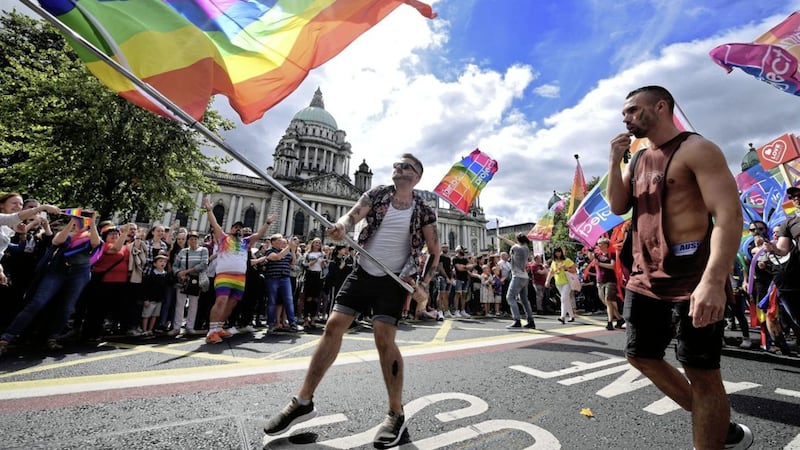IN a fortnight of festivals that have shown the best of Northern Ireland there has also been a very visual demonstration of just how far apart the main political parties are on crunch issues.
Belfast Pride brought 50,000 people onto the streets of the city at the weekend in a riot of joyous colour.
The number of businesses, government departments and police that had visual representatives at the parade was a heartening display of solidarity and a sign of support for the LGBT community who have previously been marginalised, discriminated against and persecuted by all of the above.
The DUP remain the only party fully in opposition to same-sex marriage, which is just one of the issues that have been blocked or postponed by political disfunction.
The sight of all those thousands of people, many from the unionist and loyalist community, marching through town in celebration and protest must surely sound a huge alarm bell at DUP HQ about the futility of the continuing opposition to social change.
In west Belfast, Féile an Phobail has been in full swing this week with hundreds of talks and events.
While the talks have varied in subject from Brexit and apartheid to education, housing and even how to make a decent cup of tea, it is the flagship political talk The Leaders Debate that attracted the most media attention.
For the first time the debate brought together senior politicians from across the island, a sure sign of where the discussions around dinner tables have started to take us.
The border poll, regardless of what side of that debate you're on, is now very much a subject up for discussion.
And so that topic was always going to be on the agenda at the debate held in St Mary's College and chaired expertly by the BBC's Mark Carruthers.
The Republic's health minister, Fine Gael's Simon Harris, who managed to charm so many during the recent repeal referendum with his easy manner, and Fianna Fail's Lisa Chambers were not the only politicians standing in for their party leaders.
Simon Hamilton stood in for party leader Arlene Foster, who had been critical of the festival earlier this year when An Taoiseach Leo Varadkar launched the programme.
At the time Ms Foster said in a message posted on Twitter that she was "very concerned at the message Leo Varadkar is sending with his apparent endorsement of all events at the west Belfast festival".
The DUP had declined to send anyone to the Pride Talksback political event, it was a welcome step forward that Mr Hamilton attended the west Belfast debate.
I would hope that had his party leader chosen to attend, just like when she made the decision to attend Martin McGuinness's funeral, that she would have been welcomed warmly.
Mr Hamilton did make a valid point that I don't think anyone has even started to seriously address and that's "where was the evidence that unionists would be shown respect" in any new Ireland.
Ulster Unionist Robin Swann added that when Sinn Féin leader Mary Lou McDonald finished an Ard Fheis speech by shouting "up the rebels" that she isolated unionists.
All these points and more are valid and need explored in great detail, not just in the coming months but in the coming years as the momentum towards a border poll is likely to increase.
Brexit taught us all a valuable lesson, at least I hope it did, but voting for a flag, voting for some unobtainable vision without any real idea of what it would look like or how it would be achieved is economically disastrous.
Most nationalists and all republicans aspire to a reunited Ireland.
That aspiration started almost 100 years ago when the island was partitioned.
Despite this, over that time, those passing decades, some filled with violence, others with hope, no real work has been done on fleshing out what this island will actually look like.
Talking about how certain language and phrases can hurt and isolate and also logistics, it's easy to say 'New Ireland' harder to show what that actually means.
It's becoming repetitive to say that unionism is failing to create a comfortable Northern Ireland, one that makes staying within the United Kingdom an attractive prospect.
Instead they seem content to let one of the most unstable Westminster governments in many years protect their interests in return for support, despite the unpredictable lifespan of that Conservative administration.
But that shouldn't make nationalists complacent, that all this will lead to a reunified Ireland because of an economic Brexit disaster and an imploding Tory party.
If is it really to be a new Ireland, one that cherishes all, then unionists need to be convinced of its merits, and right now that isn't happening in any real sense.








